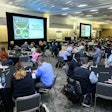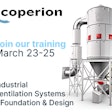
The COVID-19 pandemic affected pet food plants to varying degrees. Some plants weren’t prepared for the effect of the pandemic on their workforces, ability to receive raw materials or ship out the finished product.
Judi Lazaro, senior category directory for food safety at AIB International, said it’s only a matter of time before the next pandemic hits. Lazaro shared how to prepare for the next pandemic during a session at Petfood Forum in Kansas City on Sept. 23.
AIB’s research shows 30% of food and beverage executives believe there will be another pandemic in the next four years. Fifty percent expect it in the next decade.
“Those are pretty astounding numbers,” Lazaro said. “One pet food executive said ‘Pandemics are not new. We’ve had swine flu, SARS, so most food companies should have something in place. You should be prepared for some type of failure.’”
AIB’s research showed that 45% of executives still don’t feel very prepared for a pandemic. More than 61% of the companies experienced an increase in operating costs due to the pandemic.
Lazaro said the top challenges in preparing for a pandemic are:
- Worker health and employee shortages
- Upholding food safety
- Crisis management – did it include “pandemic?”
- Supply chain
- Intermittent operations
AIB created a “Pandemic Prepared Certification,” a consolidated standard on how to handle a pandemic. No pet food company has yet reached certification, Lazaro said. The certification requires plans to manage all the challenges listed above.
“It’s a challenging standard that has robust programs,” Lazaro said. “It shows your facility and your workforce and your employees that you are committed to doing things right.”
Lazaro said when AIB conducts audits on companies applying for Pandemic Prepared Certification, it’s identified top misses. They are:
- Not having a plan that covers a pandemic crisis scenario – more than half the companies did not have this.
- Not holding crisis management team meetings during the pandemic to assess whether a crisis response plan is working properly.
- Not putting PPE/chemicals through your supplier approval process – 70% are not doing this.
- Discarded used PPE in regular trash containers.
- No consideration for expired ingredients. You have to go back to the basics.
- Gaps in managing the integrated pest management program.
- Not training site employees on changes implemented to the food defense plan in response to COVID-19.
- Not assessing risk during the receiving process.
Lazaro said companies prepared for the next pandemic are two times more likely to have no significant changes in operating costs and are 2.5 times less likely to experience a decrease in revenue.
“Remain proactive,” Lazaro said. “Be the leader in your industry.”

















